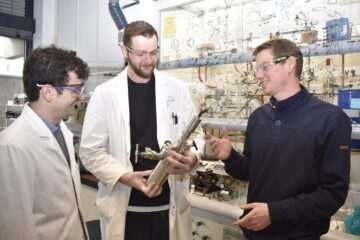UBC researcher invents ¡°lab on a chip¡± device to study malaria

Spread by mosquitoes, malaria is caused by a tiny parasite that infects human red blood cells. Ma and his team designed a ¡°lab on a chip¡± device to better understand the changes in red blood cells caused by Plasmodium falciparum, the most common species of malaria parasites.
Ma explains the device will help those conducting laboratory research or clinical trials evaluate the efficacy of different compounds in treating malaria ¨C a disease that is increasingly resistant to drugs.
¡°Our results show that it¡¯s possible to precisely measure the stiffening of red blood cells caused by the parasite at various stages of infection,¡± says Ma, assistant professor in the UBC departments of mechanical engineering and urologic sciences, and senior research scientist at the Vancouver Prostate Center.
Normal human red blood cells must squeeze through capillaries many times smaller than their own diameter in order to deliver oxygen to all tissues in the body. Red blood cells infected with malaria gradually lose this capability, which disrupts blood flow, causing failure of vital organs and eventually death.
Measuring 2¡å x 1¡å (50 cm x 25 cm), Ma¡¯s microfluidic device deforms single red blood cells through a series of funnel-shaped constrictions. The pressure required to push the cell through each constriction is measured and then used to calculate the cell¡¯s deformability.
By measuring the deformability of an infected red blood cell, researchers can obtain vital information about the status of the disease and response to treatment, explains Ma, whose findings appear in the current issue of the journal Lab on a Chip.
Ma notes that although there has been considerable research on the biomechanics of malaria, ¡°current methods to measure red cell deformability are either too complex to be used in clinical settings or are not sensitive enough.¡±
Funding for this research was provided by a grant from the Bill and Melinda Gates Foundation¡¯s Grand Challenges in Global Health program.
Media Contact
More Information:
http://www.ubc.caAll latest news from the category: Health and Medicine
This subject area encompasses research and studies in the field of human medicine.
Among the wide-ranging list of topics covered here are anesthesiology, anatomy, surgery, human genetics, hygiene and environmental medicine, internal medicine, neurology, pharmacology, physiology, urology and dental medicine.
Newest articles

Lower dose of mpox vaccine is safe
… and generates six-week antibody response equivalent to standard regimen. Study highlights need for defined markers of mpox immunity to inform public health use. A dose-sparing intradermal mpox vaccination regimen…

Efficient, sustainable and cost-effective hybrid energy storage system for modern power grids
EU project HyFlow: Over three years of research, the consortium of the EU project HyFlow has successfully developed a highly efficient, sustainable, and cost-effective hybrid energy storage system (HESS) that…

Safer alternative for an explosive reaction
The chemical industry has been using a reaction with explosive chemicals for over 100 years – now Mülheim scientists have discovered a safer alternative. The Ritter Group of the Max…





















